|
Utilizing Your Resources |
|
Geothermal has been used to heat and cool commercial and residential structures for over a half of century. When the modern units started into the market, the air cooled units, electric cost was considerably low. But with the rising cost of energy and the new billing concept “High Peak Demand” has homeowners looking to save real money. The Heating and Cooling is the largest part of any electric bill. With the new generation of Geothermal Heat Pumps systems, the newest technology, and the alternate resources available when designing a system makes geothermal more attractive than just digging a ground loop, which stopped most from using Geothermal. |
|
To contact us: |
|
Geothermal Loop Designs & Installation Solutions |
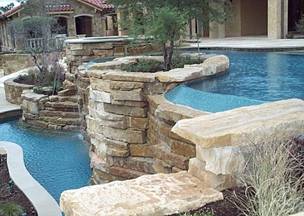
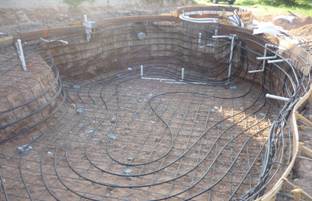
|
Lake & Pond Loop
Utilizing a Lake or pond has also been around for years and has been very effective. There are several ways to design the loop. A few factors to consider is the size, depth, and water level in extreme drought conditions. The most common is a slinky loop, creating multiple tracks linking them together as one or having several tracks and utilizing a manifold. Then sinking it to the bottom.
Another is to utilize a closed loop heat exchanger as shown below, then sinking it to the bottom. This copper exchanger is less labor intense, found to be cheaper and very effective.
A pump and dump could be used if the lake is clean in the area for the filter placement and deep. The intake filter housing must be off the bottom. This designs works with the correct filter system to protect the Water / Freon exchanger in the geothermal unit. This design is to be considered an open loop and a in-line pump will have to be used. |
|
Pond Loop
Utilizing a pond has been around for years and has been very effective. There are several ways to design the loop. A few factors to consider is the pond size, depth, and water level in extreme drought conditions. The most common is a slinky loop, creating multiple tracks linking them together as one or having several tracks and utilizing a manifold. Then sinking it to the bottom.
Another is to utilize a closed loop exchanger as shown above, then sinking it to the bottom. This copper exchanger is less labor intense, found to be cheaper and very effective.
A pump and dump could be used if the pond is clean and deep. The water must hold a cool constant temperature, as for most ponds are shallow and rise in temperature in the summer months. Must use a correct filter system. The intake filter housing must be off the bottom. This design is considered to be an open loop and a in-line pump will have to be used. |
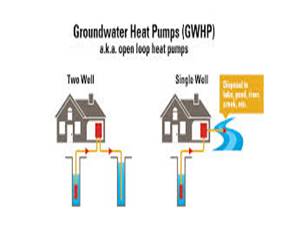
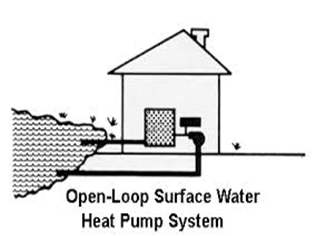
|
Horizontal Ground Loop
This installation was one of the first solutions. Now most common when new construction is being done. Planning and digging when there is no obstructions and easy access to the landscaping. Several considerations when designing, depth and width. Geographic location. This is a close loop. |
|
Vertical Ground Loop
When space is limited a vertical loop is considered. This installation requires several holes dug down deep into the ground. With pipe going down and up looping into several holes before returning to the geothermal unit. Today this installation can be expensive but very efficient due to pockets of water. This is a close loop. |
|
Well Ground Loop
This installation can be installed several ways. One is to just pull water from a well, pass it through the geothermal system then discharge it. South Florida has thousands of these installations, but the main problem was retaining a water levels in the well. The other problem was discharging the water, most was running a sprinkler system when the unit was running, but you can only water grass for so long, then it was dumped into the gutter or city sewer drain. This concept was considered not very environmentally friendly. A Single well system is to dig one deep well vertically into the ground and drawing the water at one level and discharging back into the same well at another depth or level or if available discharging into a pond or lake. Two wells installation design is using two deep wells dug vertically into the ground proximally 20 feet apart. One was to draw the water out sending it to the geothermal unit then discharging it back into the other well. These are considered to be open loops. |
|
River - Lake - Pond Loop
A river, lake, or pond installation makes an excellent geo-exchange, transfer of heat, but it takes several design factors into consideration. Just a few thoughts, history of the rivers flow during extreme droughts, current speeds, depth for placement, and accessibility. Placement under a dock seems to be the best for a river. Utilizing this closed loop Hybrid Heat Exchanger as shown works perfect. This unit saves time and money. Utilizing today’s new technology in filters a pump and dump could work if the intake placement is attached to a dock, but it must be in deep water and the discharge could be closer to the river bank. |

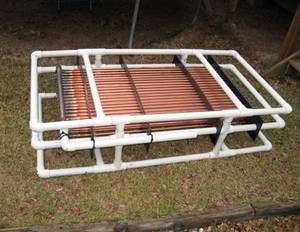
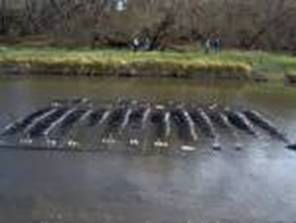
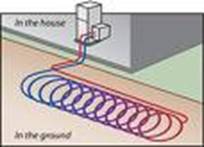
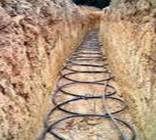
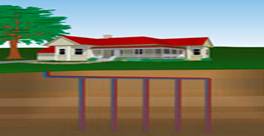
|
Slinky Ground Loop
This installation is very popular today. Used when space is a issue. Less digging of trenches. Although the depth is the same but the length is a lot less. In most cases several trenches are needed. This is a close loop. |
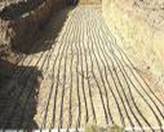
|
Swimming Pool Loop
This is a very unique geothermal design application. It works several ways and may be used with or with out a Evaporative Cooling Tower. Depends on the geographic location the geothermal installation is being applied. If an in-ground pool already exist, a Cooling Tower most likely will be needed, depends on the size and location of the pool. This is a very energy efficient system and has added benefits.
If you are designing and building an in-ground pool consider under ground geothermal piping. Very easily done during construction.
Using a swimming pool as a heat exchanger will extend your swimming season and get the most out of your pool. |
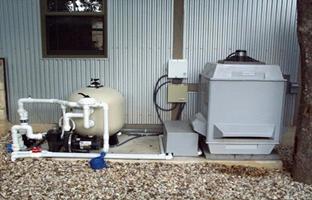
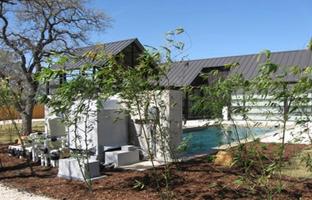
|
Remember the above geothermal loop illustrations is to get you thinking on what resources you have available. The Geothermal Heat Pump System is a very efficient unit, offering one of the best warranties in the HVAC industry. With so many extra benefits and options that can be added will save you real money! Also a geothermal heat pump unit has an added option available to make your HOT water.
Commercial Units are also available to save Business on their Heating and Cooling!
Call so we can help you design your Energy Saving System. |
|
Email:
info@miamiheatpumps.com
sales@miamiheatpumps.com |
|
Geothermal Units
Conventional Heating & Air Conditioning
|
|
Phone:
(561) 705-7341
(904) 424-9773
|